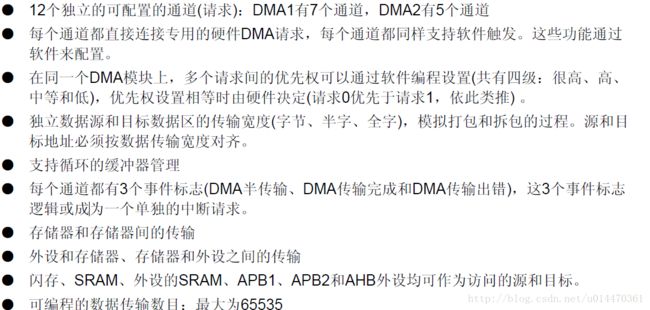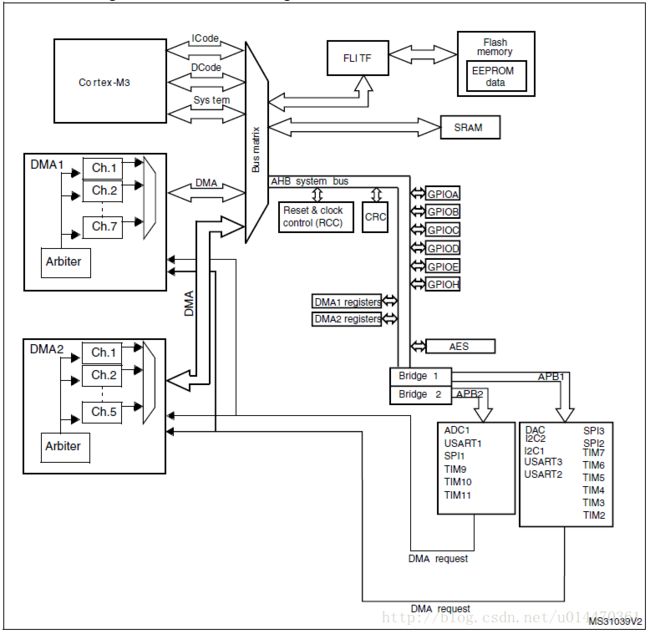STM32—DMA使用
DMA简介
DMA:Direct memory access controller,直接存储器存储。DMA可以实现数据在外设与存储器、存储器与存储器之间的快速转换,且不需要CPU的干预,这样就可以释放CPU的资源,让CPU干其他的事情,提高效率。有的STM32芯片有两个DMA,有的就只有一个DMA,这个要查具体的芯片手册。
DMA 的主要特性
DMA的功能框图
DMA参数与函数解析
上一篇文章(链接)中利用USART DMA 实现接收任意长度数据,下面分析下DMA里面的参数和函数。首先查看DMA的结构体定义。
DMA_HandleTypeDef hdma_usart1_rx; * @brief DMA handle Structure definition
*/
typedef struct __DMA_HandleTypeDef
{
DMA_Stream_TypeDef *Instance; /*!< Register base address */ //DMA的寄存器基地址
DMA_InitTypeDef Init; /*!< DMA communication parameters */ // 初始化结构体
HAL_LockTypeDef Lock; /*!< DMA locking object */
__IO HAL_DMA_StateTypeDef State; /*!< DMA transfer state */
void *Parent; /*!< Parent object state */
void (* XferCpltCallback)( struct __DMA_HandleTypeDef * hdma); /*!< DMA transfer complete callback */
void (* XferHalfCpltCallback)( struct __DMA_HandleTypeDef * hdma); /*!< DMA Half transfer complete callback */
void (* XferM1CpltCallback)( struct __DMA_HandleTypeDef * hdma); /*!< DMA transfer complete Memory1 callback */
void (* XferM1HalfCpltCallback)( struct __DMA_HandleTypeDef * hdma); /*!< DMA transfer Half complete Memory1 callback */
void (* XferErrorCallback)( struct __DMA_HandleTypeDef * hdma); /*!< DMA transfer error callback */
void (* XferAbortCallback)( struct __DMA_HandleTypeDef * hdma); /*!< DMA transfer Abort callback */
__IO uint32_t ErrorCode; /*!< DMA Error code */
uint32_t StreamBaseAddress; /*!< DMA Stream Base Address */
uint32_t StreamIndex; /*!< DMA Stream Index */
}DMA_HandleTypeDef;typedef struct
{
__IO uint32_t CR; /*!< DMA stream x configuration register */
__IO uint32_t NDTR; /*!< DMA stream x number of data register */
__IO uint32_t PAR; /*!< DMA stream x peripheral address register */
__IO uint32_t M0AR; /*!< DMA stream x memory 0 address register */
__IO uint32_t M1AR; /*!< DMA stream x memory 1 address register */
__IO uint32_t FCR; /*!< DMA stream x FIFO control register */
} DMA_Stream_TypeDef;
typedef struct
{
uint32_t Channel; /*!< Specifies the channel used for the specified stream.
This parameter can be a value of @ref DMA_Channel_selection */
uint32_t Direction; /*!< Specifies if the data will be transferred from memory to peripheral,
from memory to memory or from peripheral to memory.
This parameter can be a value of @ref DMA_Data_transfer_direction */
uint32_t PeriphInc; /*!< Specifies whether the Peripheral address register should be incremented or not.
This parameter can be a value of @ref DMA_Peripheral_incremented_mode */
uint32_t MemInc; /*!< Specifies whether the memory address register should be incremented or not.
This parameter can be a value of @ref DMA_Memory_incremented_mode */
uint32_t PeriphDataAlignment; /*!< Specifies the Peripheral data width.
This parameter can be a value of @ref DMA_Peripheral_data_size */
uint32_t MemDataAlignment; /*!< Specifies the Memory data width.
This parameter can be a value of @ref DMA_Memory_data_size */
uint32_t Mode; /*!< Specifies the operation mode of the DMAy Streamx.
This parameter can be a value of @ref DMA_mode
@note The circular buffer mode cannot be used if the memory-to-memory
data transfer is configured on the selected Stream */
uint32_t Priority; /*!< Specifies the software priority for the DMAy Streamx.
This parameter can be a value of @ref DMA_Priority_level */
uint32_t FIFOMode; /*!< Specifies if the FIFO mode or Direct mode will be used for the specified stream.
This parameter can be a value of @ref DMA_FIFO_direct_mode
@note The Direct mode (FIFO mode disabled) cannot be used if the
memory-to-memory data transfer is configured on the selected stream */
uint32_t FIFOThreshold; /*!< Specifies the FIFO threshold level.
This parameter can be a value of @ref DMA_FIFO_threshold_level */
uint32_t MemBurst; /*!< Specifies the Burst transfer configuration for the memory transfers.
It specifies the amount of data to be transferred in a single non interruptible
transaction.
This parameter can be a value of @ref DMA_Memory_burst
@note The burst mode is possible only if the address Increment mode is enabled. */
uint32_t PeriphBurst; /*!< Specifies the Burst transfer configuration for the peripheral transfers.
It specifies the amount of data to be transferred in a single non interruptible
transaction.
This parameter can be a value of @ref DMA_Peripheral_burst
@note The burst mode is possible only if the address Increment mode is enabled. */
}DMA_InitTypeDef;USART的tx和rx的DMA 配置在串口的初始化函数中进行了配置,下面分析在配置的参数。
void HAL_UART_MspInit(UART_HandleTypeDef* huart)
{
GPIO_InitTypeDef GPIO_InitStruct;
if(huart->Instance==USART1)
{
/* USER CODE BEGIN USART1_MspInit 0 */
/* USER CODE END USART1_MspInit 0 */
/* Peripheral clock enable */
__HAL_RCC_USART1_CLK_ENABLE();
/**USART1 GPIO Configuration
PA9 ------> USART1_TX
PA10 ------> USART1_RX
*/
GPIO_InitStruct.Pin = GPIO_PIN_9|GPIO_PIN_10;
GPIO_InitStruct.Mode = GPIO_MODE_AF_PP;
GPIO_InitStruct.Pull = GPIO_PULLUP;
GPIO_InitStruct.Speed = GPIO_SPEED_FREQ_VERY_HIGH;
GPIO_InitStruct.Alternate = GPIO_AF7_USART1;
HAL_GPIO_Init(GPIOA, &GPIO_InitStruct);
/* USART1 DMA Init */
/* USART1_RX Init */
hdma_usart1_rx.Instance = DMA2_Stream2;//DMA2通道2
hdma_usart1_rx.Init.Channel = DMA_CHANNEL_4;//不明白这个CHANNEL4通道4是什么意思,有知道的请告知一下
hdma_usart1_rx.Init.Direction = DMA_PERIPH_TO_MEMORY;//rx,从外设到存储器
hdma_usart1_rx.Init.PeriphInc = DMA_PINC_DISABLE;//外设地址增量失能
hdma_usart1_rx.Init.MemInc = DMA_MINC_ENABLE;//存储器地址增强使能
hdma_usart1_rx.Init.PeriphDataAlignment = DMA_PDATAALIGN_BYTE;//数据宽度:byte 8位
hdma_usart1_rx.Init.MemDataAlignment = DMA_MDATAALIGN_BYTE;//数据宽度:byte 8位
hdma_usart1_rx.Init.Mode = DMA_NORMAL;//正常模式,非循环模式
hdma_usart1_rx.Init.Priority = DMA_PRIORITY_LOW;//低优先级
hdma_usart1_rx.Init.FIFOMode = DMA_FIFOMODE_DISABLE;//FIFO失能
if (HAL_DMA_Init(&hdma_usart1_rx) != HAL_OK)
{
_Error_Handler(__FILE__, __LINE__);
}
__HAL_LINKDMA(huart,hdmarx,hdma_usart1_rx);
/* USART1_TX Init */ //通道与RX不一样, 其余一样
hdma_usart1_tx.Instance = DMA2_Stream7;//DMA2 通道7
hdma_usart1_tx.Init.Channel = DMA_CHANNEL_4;
hdma_usart1_tx.Init.Direction = DMA_MEMORY_TO_PERIPH;//tx, 存储器到外设
hdma_usart1_tx.Init.PeriphInc = DMA_PINC_DISABLE;
hdma_usart1_tx.Init.MemInc = DMA_MINC_ENABLE;
hdma_usart1_tx.Init.PeriphDataAlignment = DMA_PDATAALIGN_BYTE;
hdma_usart1_tx.Init.MemDataAlignment = DMA_MDATAALIGN_BYTE;
hdma_usart1_tx.Init.Mode = DMA_NORMAL;
hdma_usart1_tx.Init.Priority = DMA_PRIORITY_LOW;
hdma_usart1_tx.Init.FIFOMode = DMA_FIFOMODE_DISABLE;
if (HAL_DMA_Init(&hdma_usart1_tx) != HAL_OK)// 初始化函数, 主要对DMA的寄存器中配置上面的参数
{
_Error_Handler(__FILE__, __LINE__);
}
__HAL_LINKDMA(huart,hdmatx,hdma_usart1_tx);
/* USART1 interrupt Init */
HAL_NVIC_SetPriority(USART1_IRQn, 0, 0);
HAL_NVIC_EnableIRQ(USART1_IRQn);
/* USER CODE BEGIN USART1_MspInit 1 */
/* USER CODE END USART1_MspInit 1 */
}
}
MX_DMA_Init的初始化函数中开始了DMA2的时钟和设置了DMA 通道的中断优先级,使能对应中断。
static void MX_DMA_Init(void)
{
/* DMA controller clock enable */
__HAL_RCC_DMA2_CLK_ENABLE();//DMA2时钟使能
/* DMA interrupt init */
/* DMA2_Stream2_IRQn interrupt configuration */
HAL_NVIC_SetPriority(DMA2_Stream2_IRQn, 0, 0);//设置中断优先级
HAL_NVIC_EnableIRQ(DMA2_Stream2_IRQn);//使能中断
/* DMA2_Stream7_IRQn interrupt configuration */
HAL_NVIC_SetPriority(DMA2_Stream7_IRQn, 0, 0);
HAL_NVIC_EnableIRQ(DMA2_Stream7_IRQn);
}
